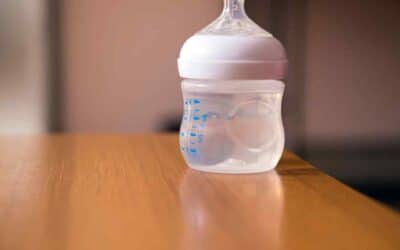As babies grow, they begin to explore the world around them, including food. Feeding time can be a challenging experience for both the baby and the caregiver. It is crucial to have the right tools to ensure feeding is a safe and comfortable experience for the baby. Choosing the proper infant spoons and forks can make all the difference.
This article will explore the best baby spoons and forks available in the market for safe and comfortable mealtime. From materials to baby spoon design, we will cover everything you need to know to make feeding time a breeze.

When Do Babies Start Using Utensils?
Before your little bundle of joy even learns the basics of baby-led weaning, they must learn how to swallow foods such as mashed or pureed food using a baby spoon. Generally, babies begin to show interest in baby spoons between the ages of ten and twelve months [1]. During this time, they may start to reach for objects on the table, mimic baby spoon-feeding motions, or even try to grab brightly colored spoons from your hand. However, it’s important to note that every baby is different; some may take longer to develop these skills than others.
When your baby shows interest in baby spoons, introducing them gradually is a good idea. Begin with simple, easy-to-grasp baby spoons like a soft-tipped baby spoon or a soft silicone-tipped fork. These utensils are designed to be gentle on your baby’s gums and can help ease the transition to solid foods.
Initially, your baby may be unable to use baby spoons to feed themselves effectively. Fortunately, babies will learn self-feeding through practice. Encourage your baby to hold the baby spoon and guide it to their mouth, or offer a small amount of food on the utensil for them to try. Being patient and supportive as your baby learns this new skill is essential.
As your baby gets more comfortable with baby spoons, you can introduce more complex baby spoons, such as a child-sized baby spoon or fork. These utensils are designed to fit comfortably in your baby’s hand and can help them develop their fine motor skills.
It’s important to remember that using baby spoons is a new skill for your baby, and it may take time and practice before they become proficient. Some babies may take weeks or months to become comfortable with baby spoons, while others may master them quickly. Being patient and supportive and celebrating your baby’s successes along the way is essential.
In addition to introducing baby spoons, it’s essential to continue to offer your baby finger foods and allow them to explore textures and flavors. Finger foods can help your baby develop their hand-eye coordination and can be a fun way to explore different tastes and textures.
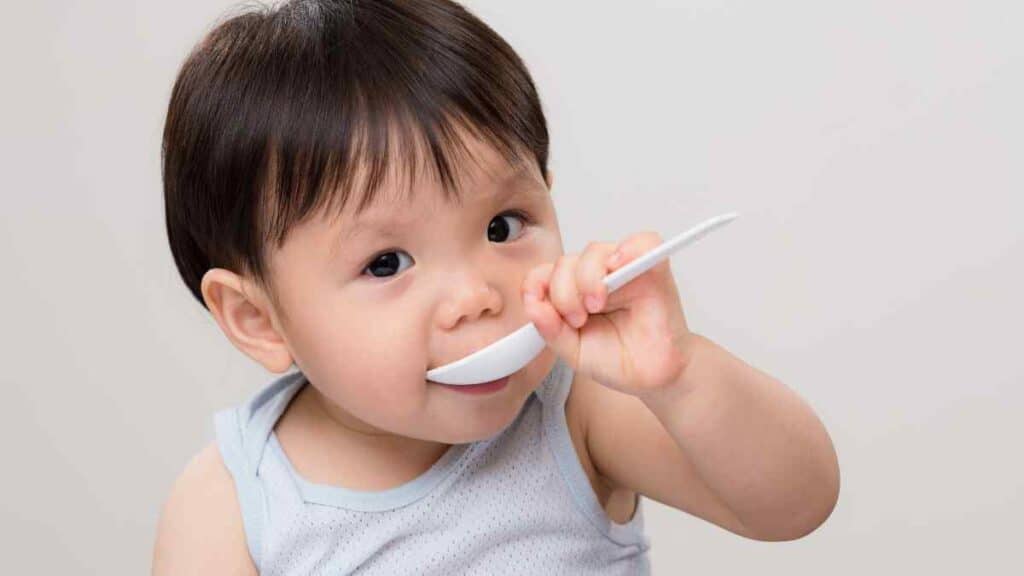
Types of Baby Spoons and Forks
Now that you know when babies typically start using utensils, it’s essential to consider the types of baby spoons and forks available to help you teach your child about baby-led weaning. When choosing utensils for your little one, there are several factors to consider, such as the material, size, and shape of the baby spoons.
Soft-Tipped Spoons
Soft-tipped spoons are a popular option for babies just starting to use utensils. These spoons have a soft, rubbery tip that is gentle on your baby’s gums and teeth. They’re also usually made of BPA-free materials and are easy to clean. Soft-tipped spoons come in various shapes and sizes, so it’s easy to find one your baby can comfortably hold and use.
Food Grade Silicone
Tipped Spoons and Forks Food Grade Silicone-tipped spoons and forks are another excellent option for babies learning to use baby utensils. These utensils have a soft, flexible food-grade silicone tip that is gentle on your baby’s mouth. They’re also usually dishwasher safe and come in various colors and designs.
Training Spoons and Forks
Training spoons and forks are designed to help babies develop their fine motor skills and learn how to use utensils. These toddler utensils often have a thicker handle that is easy for your baby to grip and may also have textured or contoured handles for added grip. Some training spoons and forks also come with unique features, such as removable handles or weighted bases, to make them easier for your baby to use.
Child-Sized Spoons and Forks
Child-sized spoons and forks are designed for toddlers ready to move on from toddler utensils. These utensils are typically smaller than adult-sized utensils and have shorter handles that are easier for little hands to grip. They may also have fun designs or characters on them to make mealtime more enjoyable for your little one.

What to Look for in Baby Spoons and Forks?
After discussing the many kinds of baby spoons and forks offered, let’s look more closely at the factors to consider while selecting utensils for your child. The following points should be remembered:
Material
It’s vital to choose the best baby spoons that are made from safe materials. Look for utensils that are BPA-free, phthalate-free, and PVC-free. You may also want to consider utensils made from natural materials, such as bamboo or wood.
Size and Shape
Choose the best baby spoons that are appropriate for your baby’s age and development. Soft-tipped and silicone-tipped spoons are great options for younger babies just starting to use utensils, while child-sized spoons and forks are better for older babies and toddlers. Look for utensils with handles that are easy for your baby to grip, and consider textured or contoured handles for added grip. You should also consider if it’ll fit inside your baby’s diaper bag in case you’re traveling.
Ease of Use and Cleaning
Choose utensils that are easy for your baby to use and easy for you to clean. Avoid utensils with sharp edges or difficult-to-clean crevices [2]. Look for utensils that are top-rack dishwasher safe or can be easily wiped clean.
Durability
Choose utensils that are durable and built to last. Look for utensils made from sturdy materials that can withstand regular use and won’t break or bend easily.
Design and Style
Finally, consider the design and style of the utensils. Look for utensils with fun colors, patterns, or characters your baby will enjoy. Choosing utensils with fun designs can make mealtime more enjoyable for your little one, which can be an excellent way to introduce your growing toddler to baby-led weaning.
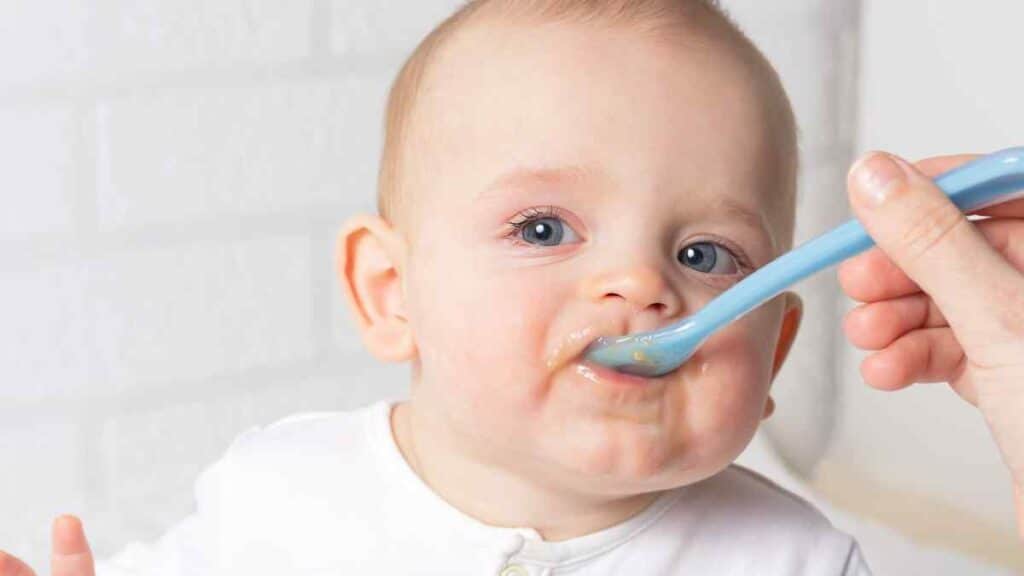
Best Baby Spoons Based on Needs
Choosing suitable baby spoons for self-feeding can make a big difference in your baby’s success at this stage. But with so many baby spoons available, how do you know the best baby spoons for self-feeding? Here are a couple of the best baby spoons available so that you can make the right decision:
Best Baby Spoons for Self-feeding
Numnum Pre-Spoon Gootensils
Numnum pre-spoon gootensils are ideal for ages six months to more than a year. It has a thick and contoured handle, making it easier for the baby to handle the baby spoon comfortably and securely. The Numnum baby utensils are also ideal for any food and have design features that work great with purees and soft other soft foods.
Best All-Silicone Baby Spoon
PrimaStella Silicone Rainbow Chew Spoon
PrimaStella is made of food-grade silicone designed to make it easier for babies to consume solid foods when self-feeding. Since it’s made of soft yet durable textured spoon tips, it’s an ideal option for teething without hurting the baby’s tender gums. You can even pop it in the freezer before giving it to your baby to provide extra soothing relief for their tender gums.
Best Soft-Tip Baby Spoons
Munchkin 12-Piece Soft-Tip Infant Spoon Utensils
Munchkin spoons have 12 distinct infant spoon utensils that are also gentle on the gums and ergonomically designed with comfort in mind. Every spoon bowl is also top-rack dishwasher safe which makes it an excellent choice for parents who are always busy. The spoon bowl also has the right length for self-feeding baby food, making it an excellent choice for parents who are looking for baby-led weaning spoons.

Best baby Spoon for Travel
Oxo Tot-on-the-Go Feeding Spoon
Oxo Feeding utensils have design features specially made for travel. It includes a travel case that fits easily into a diaper bag and handbags when you’re on the go. Compared to other spoon bowl designs, the soft silicone spoons are soft on the baby’s mouth and gums and are effective for scraping food from jars or food bowls. It’s also dishwasher-safe and has a specially designed contoured handle for easy self-feeding.
Best Eco-friendly Baby Spoon
Baby K Self-Feeding Bamboo Baby Spoons
Many parents also consider Baby K self-feeding infant utensils to be one of the best baby spoons in the market today because of their safe and comfortable soft silicone tip. Because of its BPA-free silicone tip, you can rest easy knowing your baby is chewing on food-grade materials. It’s also great for your baby’s mouth and is an excellent choice when introducing baby utensils to your baby.
Best Baby Spoon and Fork Set
Re-Play Toddler Feeding Spoon and Fork Set
Re-play toddler utensils are another option made with sustainable materials, making them safe for the plant. Each baby fork and spoon set is made of sustainable HDPE materials, which are 100% recyclable and reduce the use of single-use plastic. The toddler spoon set is also BPA-free, ensuring that your baby is safe from potential chemical exposure.
How Do I Spoon Feed My Baby?
Now that you’ve found the best baby spoons for your little one, you may wonder how to spoon-feed them properly. Spoon feeding is an essential skill babies need to learn as they transition from breast milk or formula to solid foods. In this column, we will review some tips and tricks for spoon-feeding your baby effectively.
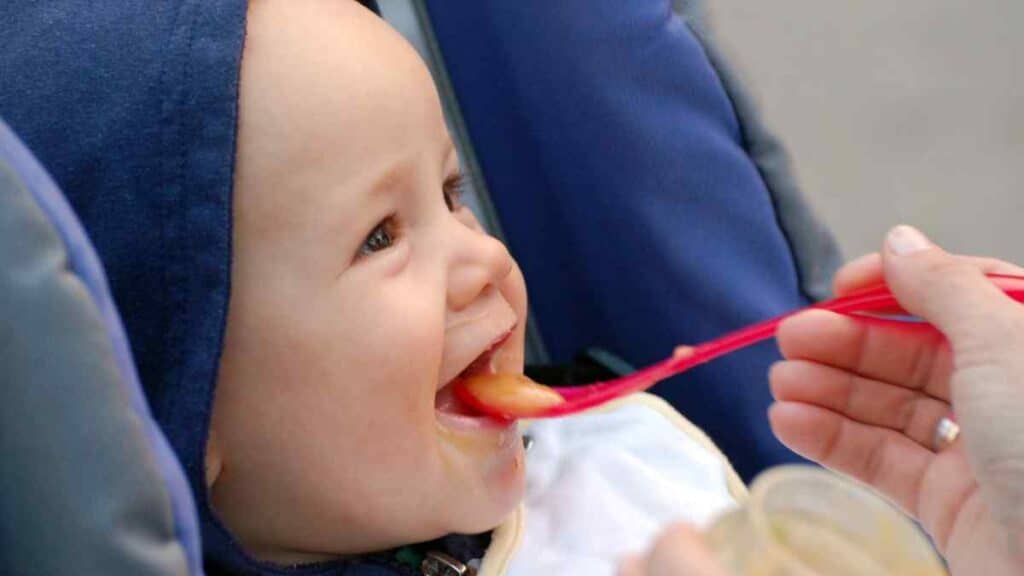
Start Slowly
When introducing solid foods to your baby, it’s important to start slowly. Begin with small amounts of food, such as a teaspoon or two, and gradually increase the amount as your baby becomes more comfortable with spoon-feeding.
Positioning
Position your baby comfortably in a high chair or on your lap. Make sure their head is supported, and they are sitting up straight. This will make it easier for them to swallow the food and avoid choking.
Hold the Spoon
Correctly Hold the spoon correctly and steadily, with the tip pointing downwards. This will make it easier for your baby to take the food off the spoon.
Be Patient
Spoon feeding can be a messy and slow process, so it’s essential to be patient. Your baby may take some time to get used to the spoon and the texture of solid foods. Allow them to explore the food and go at their own pace.
Observe Your Baby’s Signals
Observe your baby’s signals and reactions as you spoon-feed them. If they turn away or seem uninterested, they may still need to be ready for solid foods. If they’re fussy or crying, they may be full or not in the mood to eat. Be responsive to your baby’s signals and adjust accordingly.
Are Silicone Spoons Good for Babies?
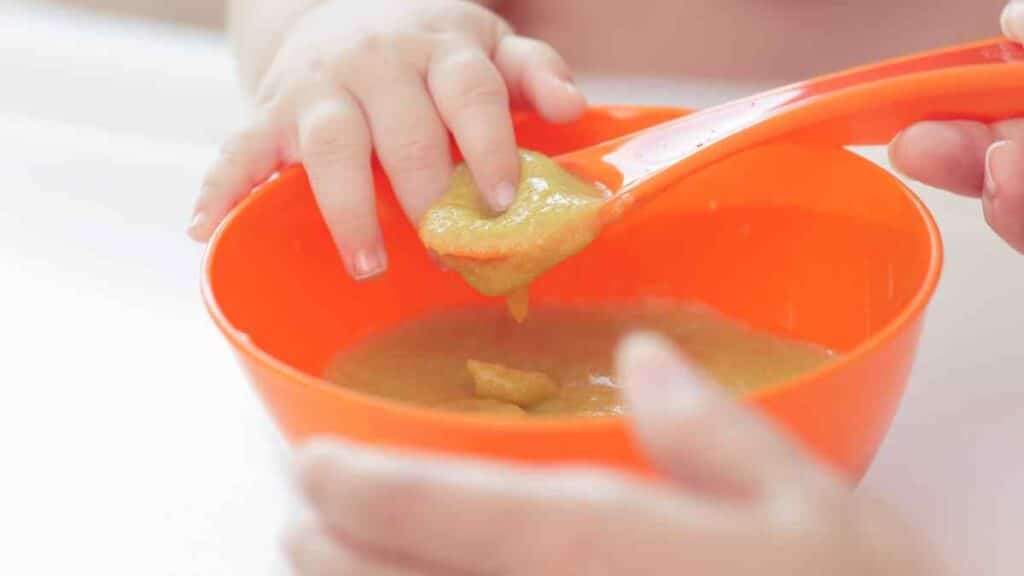
As a parent, you want to make sure that everything you give to your baby is safe and gentle on their delicate bodies. This includes the utensils you use to feed them. Silicone spoons have become increasingly popular among parents as a safer alternative to plastic or metal spoons. But are silicone spoons good for babies? Let’s explore the benefits and drawbacks of using silicone spoons for your little one.
Benefits of Silicone
- Spoons for Babies Silicone spoons are made from a soft, flexible material that is gentle on your baby’s gums and teeth. This can be especially beneficial during the teething stage when your baby’s gums may be sore or tender.
- Silicone spoons are also durable and long-lasting, so you won’t have to replace them as often as plastic or metal spoons.
- Additionally, silicone spoons are usually dishwasher-safe and easy to clean, making mealtime clean-up a breeze.
Drawbacks of Silicone Spoons for Babies
- One potential drawback of using silicone spoons is that they can be more expensive than plastic or metal spoons.
- Additionally, some parents may prefer the weight and feel of metal spoons for their babies.
- Silicone spoons also tend to bend or flex, making it more difficult to scoop up food or get the spoon into your baby’s mouth.
Safety of Silicone Spoons for Babies
Silicone is a safe material for baby spoons. It is non-toxic and does not contain harmful chemicals such as BPA, phthalates, or PVC. However, choosing high-quality silicone spoons from reputable brands is essential to ensure that they meet safety standards.
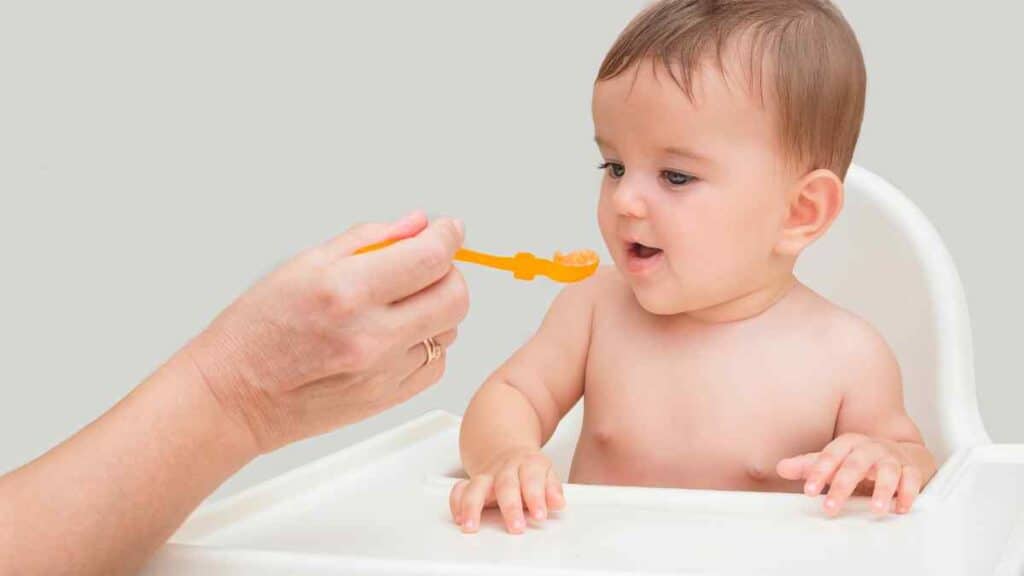
Conclusion
Choosing the best baby spoons and forks for your little one can make feeding time a safe and comfortable experience for you and your baby. Soft-tipped spoons, silicone-tipped spoons and forks, training spoons and forks, and child-sized spoons and forks are all great options to consider when choosing utensils for your baby.
Factors such as the material, size and shape, ease of use and cleaning, durability, and design and style should be considered when selecting utensils. By finding the proper utensils for your baby, you can help them develop their fine motor skills and encourage their independence at mealtime.
Remember to be patient and supportive as your baby learns to use utensils, and celebrate their successes along the way. With the right baby spoons and forks, feeding your little one can be an enjoyable and stress-free experience for everyone.
If you have any questions, please feel free to leave a comment below.



